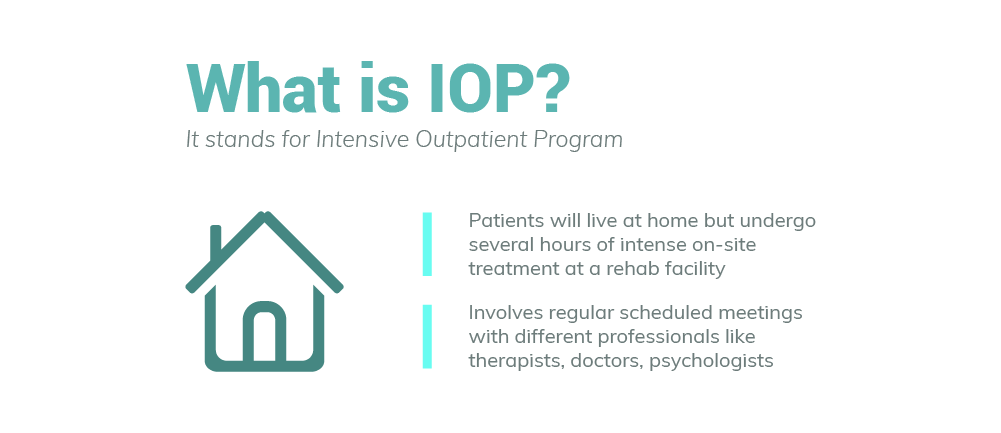Choosing the right treatment program is a crucial first step on the path to addiction recovery. With so many options available, it’s easy to feel overwhelmed, especially when terms like IOP (Intensive Outpatient Program) and PHP (Partial Hospitalization Program) are involved. These two types of structured outpatient care are among the most effective solutions for individuals who need support, therapy, and accountability without requiring 24-hour supervision.
In this article, we’ll explore the core differences between IOP and PHP, including their structure, intensity, benefits, and who each is best suited for. Whether you're seeking help for yourself or a loved one, this guide will provide the clarity needed to make an informed decision about which level of care is the best fit for your addiction recovery journey.
What Is a PHP (Partial Hospitalization Program)?
A Partial Hospitalization Program (PHP) is a comprehensive, short-term form of intensive addiction treatment. It offers many of the same services found in inpatient rehab, such as medical care, behavioral therapy, group counseling, and psychiatric support—but participants return home at night.
PHPs are ideal for individuals who need structured treatment but can function safely outside a residential facility. This makes PHP an effective step-down option after detox or inpatient rehab, or as a step-up for those whose outpatient programs are not intensive enough.
Key Features of PHP

- Time Commitment: 5–6 days per week, 6–8 hours per day
- Medical Oversight: Includes regular evaluations by doctors or psychiatrists
- Therapeutic Services: CBT, DBT, trauma therapy, relapse prevention, group sessions
- Support Services: Medication management, nutritional counseling, and family therapy
- Environment: Structured, clinical setting with peer accountability
Benefits of PHP for Addiction Treatment
- Provides a high level of care without requiring overnight stays
- Supports dual diagnosis (co-occurring mental health conditions)
- Offers continuity after inpatient detox or rehab
- Promotes skill-building for relapse prevention
- Reduces chances of re-hospitalization
What Is an IOP (Intensive Outpatient Program)?

Definition and Overview
An Intensive Outpatient Program in Pennsylvania (IOP) is a step below PHP in terms of intensity but still provides focused support for those in addiction recovery. IOP allows individuals to live at home and maintain daily responsibilities (like work or school) while attending therapy multiple times per week.
IOPs are ideal for people with a stable living environment who don’t require round-the-clock medical supervision but still need consistent therapeutic support to stay on track.
Key Features of IOP
- Time Commitment: 3–5 days per week, 3–4 hours per day
- Therapeutic Services: Group therapy, individual therapy, addiction education
- Flexibility: Evening or weekend options available
- Life Integration: Encourages return to work, school, or family duties
- Environment: Supportive and structured outpatient setting
Benefits of IOP for Addiction Treatment
- More flexible than PHP, suitable for people with daily obligations
- Strong focus on relapse prevention and coping skills
- Helps reinforce accountability through regular check-ins
- Cost-effective and covered by most insurance plans
- Bridges the gap between full-time treatment and total independence
PHP vs. IOP: Side-by-Side Comparison
FeaturePHP (Partial Hospitalization)IOP (Intensive Outpatient)Time Commitment6–8 hours/day, 5–6 days/week3–4 hours/day, 3–5 days/weekMedical SupervisionFrequent physician and psychiatric oversightLimited medical check-insIdeal ForIndividuals needing structured, daily careIndividuals with moderate addiction symptomsLiving SituationMust have a safe and sober home environmentSame, with greater flexibility requiredTreatment IntensityHigherModerateCostHigher than IOPLower than PHPCommon AfterInpatient detox or residential rehabPHP or lower-level outpatient therapy
Factors to Consider When Choosing Between PHP and IOP

Severity of the Addiction
Partial Hospitalization Program in Pennsylvania is better suited for individuals with moderate to severe addiction issues or those who have recently completed detox. IOP is typically appropriate for individuals with mild to moderate addiction or those transitioning from a Partial Hospitalization Program in Pennsylvania.
Co-occurring Mental Health Disorders
If you're dealing with both substance abuse and a mental health disorder like depression, PTSD, or bipolar disorder, PHP might be the better choice due to its more robust psychiatric and medical support.
Daily Responsibilities
Intensive Outpatient Programs (IOP) are a popular option for individuals seeking Drug Addiction Treatment in Pennsylvania, especially for those who need to maintain their work, education, or caregiving responsibilities while receiving treatment. Since IOP is less time-consuming than Partial Hospitalization Programs (PHP), it allows individuals to balance their daily life with their recovery. In contrast, PHP requires a greater time commitment and may be more challenging to balance with outside obligations, making it better suited for individuals needing more structured care and intensive support.
Level of Support at Home
Both PHP and IOP assume that individuals have a safe, sober, and supportive home environment. However, if home life is unstable or triggering, PHP’s structure may offer the added support needed.
Budget and Insurance Coverage
Cost can be a deciding factor. PHP is generally more expensive than IOP, though both are significantly cheaper than inpatient rehab. Check with your provider to confirm your insurance coverage for either option.
Who Is Best Suited for a Partial Hospitalization Program?

A PHP might be the best fit if you:
- Need more than 15 hours of therapy per week
- Have recently completed inpatient rehab or detox
- Struggle with severe cravings or mental health issues
- Need frequent monitoring by medical professionals
- Lack strong coping mechanisms or are early in your recovery journey
Who Is Best Suited for an Intensive Outpatient Program?
An IOP may be ideal if you:
- Have already made some progress in recovery
- Need treatment that works around your job, school, or family
- Live in a stable home with support
- Are looking to step down from PHP or inpatient care
- Want more autonomy while staying accountable
Real-Life Success Stories: IOP and PHP in Action

Sarah’s Story – From PHP to Independence
After a two-week detox for alcohol dependence, Sarah entered a PHP. Her program included daily therapy, medical monitoring, and medication for anxiety. After two months, she transitioned into an IOP where she worked part-time and continued therapy. Sarah is now two years sober and volunteers as a peer mentor at her recovery center.
James’ Journey – Balancing Work and IOP
James struggled with opioid addiction but couldn’t take time off from work. His doctor recommended an IOP. With evening sessions three times a week, James was able to maintain his job while attending therapy. Six months later, he completed the program and continues to attend weekly alumni meetings.
Transitioning Between Programs
Many individuals start with PHP and step down to IOP as they stabilize. Others may begin with IOP and return to PHP if relapse occurs or symptoms worsen. This fluidity between levels of care ensures that treatment is dynamic and responsive to each person’s evolving needs.
Common Therapies Used in IOP and PHP

Cognitive Behavioral Therapy (CBT)
CBT helps individuals recognize and change negative thought patterns that contribute to substance use.
Dialectical Behavior Therapy (DBT)
DBT teaches emotional regulation, mindfulness, and interpersonal skills, especially useful for individuals with trauma or mood disorders.
Motivational Interviewing (MI)
MI helps resolve ambivalence toward change and enhances motivation for recovery.
Group Therapy
Participants share experiences, gain peer support, and learn from others in recovery.
Family Counseling
Addresses family dynamics, improves communication, and involves loved ones in the healing process.
Frequently Asked Questions (FAQ)
Is detox required before starting PHP or IOP?
Yes, for most participants, completing detox is a prerequisite to entering a PHP or IOP. These programs do not provide medical detoxification services.
How long do these programs last?
- PHP: Typically 2–6 weeks depending on progress and need
- IOP: 8–12 weeks, though some continue longer
Are PHP and IOP covered by insurance?
Yes. Most private insurance plans and Medicaid/Medicare cover both IOP and PHP, depending on the facility and individual policy.
Can I switch from one program to another?
Absolutely. A well-designed treatment plan will evolve with your needs. Clinical staff will guide you when it's time to step up or down in care.
Wrapping Up:
The choice between a Partial Hospitalization Program (PHP) and an Intensive Outpatient Program (IOP) depends on your personal needs, goals, and current condition. PHP offers intensive structure, perfect for those needing daily support with medical supervision. IOP offers flexibility and is ideal for those who are ready for a more independent lifestyle with continued guidance.
Whichever path you choose, remember: addiction recovery is not a one-size-fits-all journey. What matters most is that you take the first step and seek help. Both IOP and PHP offer proven, evidence-based tools to help you reclaim your life and build a sustainable recovery.
If you're still unsure, consult a certified addiction specialist or reach out to a local treatment center for a comprehensive assessment. Your recovery starts with the decision to act—make it count.



